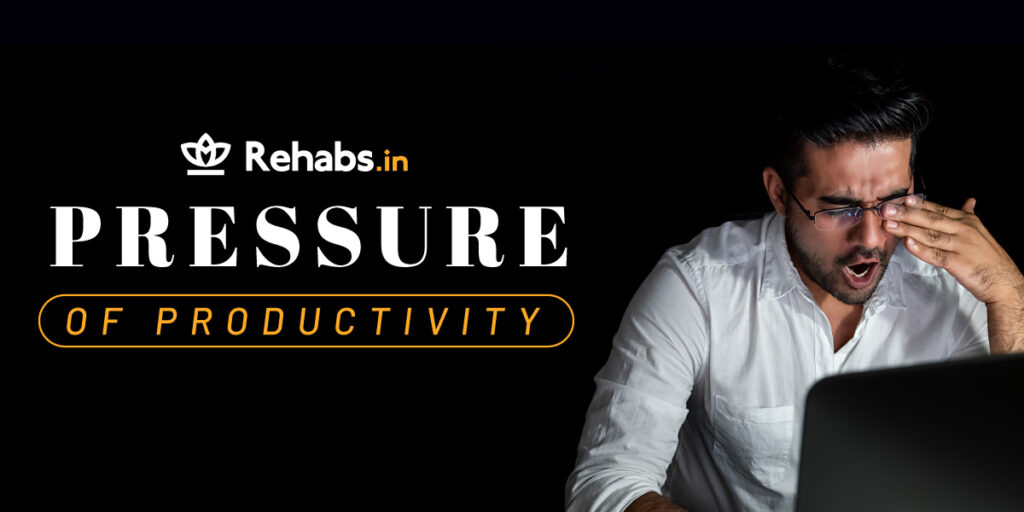How to deal with pressures of productivity

The term ‘productivity’ is the most misunderstood concept by the majority of people. Simply google the word, and the internet will load with plenty of articles suggesting ‘How to increase your productivity at work’, ‘Importance of productivity’, ‘The productivity manual’, and many more.
Today, especially in the new hybrid work system, it has become a key focus for many organisations. Even generation Z and people between jobs feel obliged to deliver a fruitful outcome at the end of the day. The intense determination to reach a sense of achievement every single day has become standard.
The question is, what cost do you have to pay to achieve the pinnacle of being the ‘best’ on a daily basis? Is being efficient at the fullest level an effortless task? Does it mean only attending to the basic needs is plenty? Or the goals achieved by your peers makes you liable to achieve yours too?
What is the issue of always being productive?
Fundamentally there is nothing wrong with productivity. Many people ingeniously schedule their day, plan their coffee breaks between work, exercise to declutter the mind and let themselves soak in their hobbies, which ultimately helps them make the best out of a day. Of course, these are essential aspects to maintain a healthy work-life balance. But, the problems make their way when the urge to accomplish something etches firmly on the mind and becomes the utmost priority.
This tenacity impacts both physical as well as mental health. And burnout is one of the common negative impacts. It is the chronic stress caused by prolonged overwork. Inevitable circumstances like the Covid-19 pandemic have aggravated this primary concern, confined to homes during a pandemic, the internet flooded with countless productivity subjects. While the intention was to promote efficient usage of time, it had detrimental effects simultaneously. According to a report by Indeed 2021, 67% of the workers believe burnout intensified post-pandemic.
Is Your Work-Life Balance Unhealthy?
Working for long hours and extreme pressure is easy to normalise, especially when other colleagues face the same amount of heat in an organisation. Some might not even realise the adverse impacts of such constraints. Taking a step back and looking at the bigger picture of productivity is every employee’s much-needed action.
Recent studies suggest asking yourself questions in the following five steps.
1) Take a deep breath and ask yourself: What is stressing me right now? Does it interfere with my personal life? What are my priorities? Often we don’t give ourselves a chance to review our work-life unless any major incidents (birth or death) compels us to do so.
2) Be all ears to your feelings: Once you answer the root cause of your stress, how does it feel? Is the pressure helping you to push yourself positively? Or is it deteriorating your peace of mind? Once you become aware of your feelings, it is easier to make changes accordingly.
3) Prioritise decently: Make a realistic comparison and ask yourself if working long hours is replacing your other foremost priorities?
4) Creating options: Is there any change you can make to prioritise your mental health?
5) Make it happen: Maybe ask for flexible working hours, not checking emails over the weekend or not stressing too much about incomplete tasks.
So what helps in being productive fairly?
Though productivity has its negative influence when exercised to a greater extent, it is essential to understand and revamp the concept for your betterment.
1) Prioritising: This is the first step to avoid burnout at the end of the day. Note down the tasks rather than keeping them in your mind. It filters out the minor jobs that hover over your mind and are not crucial for that particular day. Classify them based on importance and urgency.
2) Organisational skills: These are small things that, when performed consistently, ease out your work. It could be as small as setting your computer folders chronologically or taking a minute to plan your next task. These minor modifications declutter your mind and help you focus on the primary task. The skill encourages a healthy flow of communication between your peers, promoting collective productivity.
3) Being mindful about saying ‘yes’: When assigned a new task, take a step back and analyse the to-do list. Reject the request or unimportant meetings that disrupt your priority list. It can be challenging for some people to say ‘No’. It is a habit that often grows up with an individual, but it is crucial to comprehend that always saying ‘yes’ to everything puts intense time pressure and stress on you.
4) Mellow down: You might feel a constant urge to give your best, but the apparent reality is, “you are not a robot.” Life is not about giving 110% at each task. It’s easy for some people to stick to work 24×7 as an escape. Make room for the people that make you happy or any other hobby that lets you relax.
When to call for help?
Stress due to overwork does not cause a negative impact overnight. However, long-term burnout can be severe, and it is crucial to communicate when nothing works on personal modifications. Some of the symptoms of overstressing are as follows.
Physical signs and symptoms
- Decreased immunity and recurrent illness
- Change in sleeping pattern and appetite
- Feeling exhausted all the time
- Periodic headaches and body aches
Emotional signs and symptoms
- Using alcohol or drugs as an escape
- Detaching yourself from others
- Loss of motivation and hope
- Feeling life is not worth living
- Blunted emotions
- Feeling helpless
Life throws hurdles as well as a smooth road. It is vital to deal with these obstacles with physical and mental stability. Seek the help of professionals before the stress takes a toll on you. More importantly, to be kinder with yourself before achieving a milestone.
Sources
(2019, October 4). How to balance productivity and mental health. https://hive.com/blog/productivity-mental-health/
(2020, June 25). The problem with productivity culture is that we aren’t robots. https://uk.finance.yahoo.com/news/the-problem-with-productivity-culture-is-that-we-arent-robots-050028976.html?guccounter=1&guce_referrer=aHR0cHM6Ly93d3cuZ29vZ2xlLmNvbS8&guce_referrer_sig=AQAAAL80XBpkEvDuPmpjDV-qLeGIK_iYCmNmEMHdNciJC1dmUxUdt0SZDwwy1NXy8MGFIPSvrZNKpyE1FFe8Bgwn_4YF4Hul7AWhnH1aGbJTVa300OJgcnK9mkFtUYuByq6qqjCBdSHwCnPzU44rcZO9NcUctDLBmHjvOnrcoIbFayec
Mariza Wolch. Benefits of keeping organised at work. https://www.monster.ca/career-advice/article/benefits-of-keeping-organized-at-work
Burnout prevention and treatment. https://www.helpguide.org/articles/stress/burnout-prevention-and-recovery.htm
(2021, September 21). Work life balance. https://www.mentalhealth.org.uk/a-to-z/w/work-life-balance
Rawzaba Alhalabi. (2020, April 20). Productivity skills: Improve your time management and reduce your stress. https://www.potential.com/articles/productivity/












